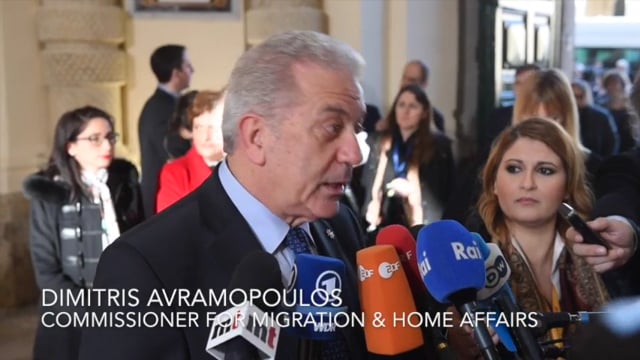[WATCH] Migration Commissioner: Malta meeting should end in consensus on solidarity, security
Home Affairs Ministers of all EU member states are meeting in Malta to discuss migration, burden sharing and measures affecting border and internal security


The European Union member states needed to find a common ground on solidarity, and it was to be hoped that a meeting of Home Affairs ministers being held in Malta would see all participants agreeing to a common interpretation of migration, the European Commissioner for Migration and Home Affairs said on Thursday.
Dimitris Avramopoulos, who was addressing media on his arrival at the President’s Palace in Valletta on Thursday for the first of a series of meetings of all EU home affairs ministers, said that he hoped that the member states would also make significant progress on matters of security.
“For more than one year, we have discussed solidarity and I think it is now the moment to move forward together,” he said. “We must respond in a strong way to the needs of the citizens in better managing migration, our European borders and ensuring the safety of all our citizens.”
Avramopoulos said that he hoped today’s meetings would result in a step forward, where the security of the EU and its citizens was concerned.
“I expect to see a step forward in members asking for cooperation, exchanging information, connecting all the dots and interconnecting our intelligence systems,” he said. “I really hope that, at the end of the day, we will all come together in a spirit of cordiality and partnership to make an important step forward.”
Maltese Home Affairs Minister Carmelo Abela, who will be chairing Thursday’s meetings, told MaltaToday that he hoped that some compromises could be reached today.
“This is an informal meeting, so no binding decisions will be taken,” he said. “But we have prepared a paper to distribute to all participants, containing a number of questions we would like answered.”

Those answers, Abela said, would help the Maltese government draw up its proposals for tackling the major issues that the Maltese presidency would like to tackle in its six-month tenure.
The minister said that the relocation of immigrants from Italy and Greece, which had been agreed to in 2015, needed to be brought up so as to ensure that commitments made are adhered to.
The ministers are expected to discuss the reform of the Common European Asylum System (CEAS), which is a priority for the Maltese Presidency of the Council of the EU, within the broader context of the need for a holistic approach to addressing the challenges of migration at an EU level.
They will also hold a discussion to take stock of the progress made to date in improving Information Technology (IT) systems, their integration and usage in order to bolster security at Europe’s borders. Ministers will also be invited to provide the Maltese Presidency of the Council of the EU with their guidance on several elements relating to use of such IT systems, so as to assist in technical work on ongoing legislative negotiations.
As a prime concern for citizens, security is one of the six priorities of the Maltese Presidency, while improving border control is one of the four elements of the holistic approach to managing migration.
Among important measures which have been taken forward, the Schengen Borders Code has been amended with regard to systematic checks for EU citizens at the external borders.
Work is also underway on new IT systems, namely the Entry/ExitSystem (EES) and the European Travel Information and Authorisation System (ETIAS), for which the European Council has established a deadline for agreement by June and December 2017 respectively. Member States are in the process of implementing the Passenger Name Records Directive.
Furthermore, discussions on the legislative proposals amending the Schengen Information System (SIS) have just commenced, following the Commission’s Proposals issued in December 2016.




.png)

.jpg)















